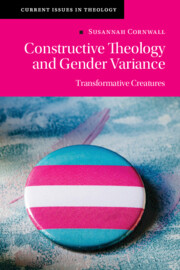Book contents
- Constructive Theology and Gender Variance
- Current Issues in Theology
- Constructive Theology and Gender Variance
- Copyright page
- Dedication
- Contents
- Acknowledgements
- Part I Setting the Scene
- Part II Telling Truths
- 4 Autonomy and Trans People
- 5 Gender Transition, Truth-Telling, and Artifice
- 6 Self-Protection or ‘Gender Fraud’?
- Part III Limits, Technology, and Health
- Part IV Transformative Creatures
- References
- Author Index
- Subject Index
4 - Autonomy and Trans People
Authenticity, Responsibility, Recognition
from Part II - Telling Truths
Published online by Cambridge University Press: 14 December 2022
- Constructive Theology and Gender Variance
- Current Issues in Theology
- Constructive Theology and Gender Variance
- Copyright page
- Dedication
- Contents
- Acknowledgements
- Part I Setting the Scene
- Part II Telling Truths
- 4 Autonomy and Trans People
- 5 Gender Transition, Truth-Telling, and Artifice
- 6 Self-Protection or ‘Gender Fraud’?
- Part III Limits, Technology, and Health
- Part IV Transformative Creatures
- References
- Author Index
- Subject Index
Summary
In 2004, the Gender Recognition Act (GRA) was passed into law in England and Wales. It enabled trans people who had been diagnosed with gender dysphoria by a medical professional and had lived in their gender of affirmation for two years to be legally recognized as members of this gender. Once the Gender Recognition Panel (a judicial body comprising judges experienced in tribunals and medical experts, to which appointments are made by the Lord Chancellor) was satisfied by the evidence provided,1 and after payment of a processing fee, trans individuals could be issued with a Gender Recognition Certificate (GRC). This meant that anyone who applied for a birth certificate based on the Gender Recognition Register would be given a certified copy that did not disclose the individual’s gender at birth, or their name at birth where this differed from that on the GRC.
- Type
- Chapter
- Information
- Constructive Theology and Gender VarianceTransformative Creatures, pp. 105 - 138Publisher: Cambridge University PressPrint publication year: 2022

